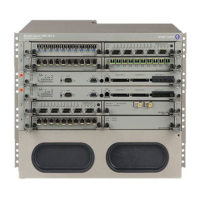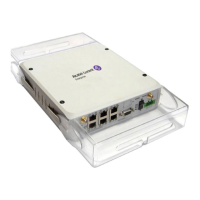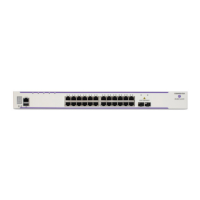VRRP
7705 SAR OS Router Configuration Guide 253
The hold-set command dampens the effect of a flapping event. The hold-set timer prevents a set event
from transitioning to the cleared state until it expires.
Each time an event transitions between cleared and set, the timer begins a countdown to 0. When the
timer reaches 0, the event is allowed to enter the cleared state. Entering the cleared state is dependent
on the object controlling the event, conforming to the requirements defined in the event itself. It is
possible, on some event types, to have another set action reset the hold-set timer. This extends the
amount of time that must expire before entering the cleared state.
Once the hold-set timer expires and the event meets the cleared state requirements or is set to a lower
threshold, the current set effect on the in-use priority of the virtual router instance can be removed.
The no form of the command reverts to the default value of 0 and the hold-set timer is disabled so that
event transitions are processed immediately.
Default 0
Parameters seconds — specifies the number of seconds that the hold-set timer waits after an event enters a set
state or enters a higher threshold set state, depending on the event type
The value of 0 disables the hold-set timer, preventing any delay in processing lower set
thresholds or cleared events.
Values 0 to 86400
priority
Syntax priority priority-level {delta | explicit}
no priority
Context config>vrrp>policy>priority-event>host-unreachable
config>vrrp>policy>priority-event>port-down
config>vrrp>policy>priority-event>route-unknown
Description This command controls the effect the set event has on the virtual router instance in-use priority.
When the event is set, the priority level is either subtracted from the base priority of each virtual router
instance or it defines the explicit in-use priority value of the virtual router instance depending on
whether the delta or explicit keyword is specified.
Multiple set events in the same policy have interaction constraints:
• if any set events have an explicit priority value, all the delta priority values are ignored
• the set event with the lowest explicit priority value defines the in-use priority used by all
virtual router instances associated with the policy
• if no set events have an explicit priority value, all the set events delta priority values are added
and subtracted from the base priority value defined on each virtual router instance associated
with the policy
